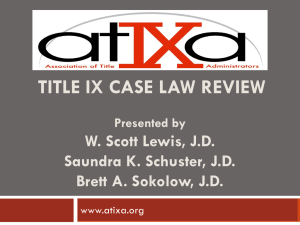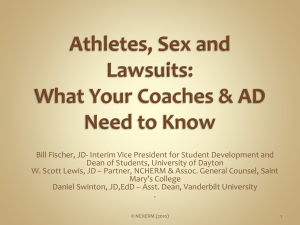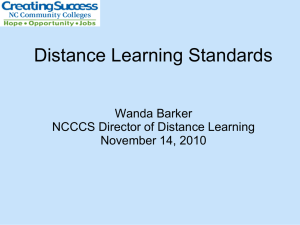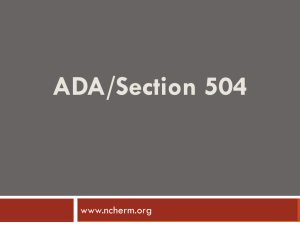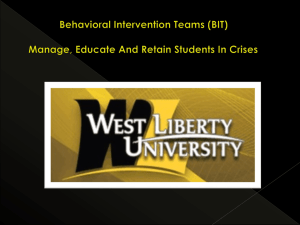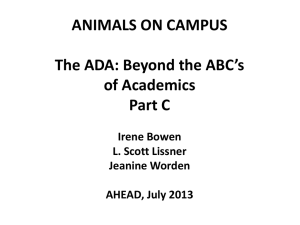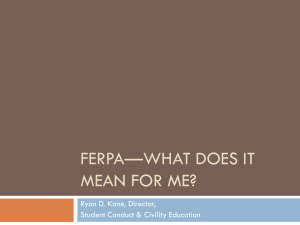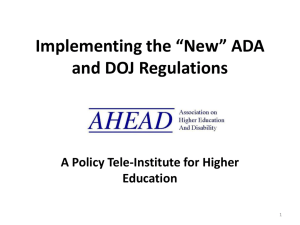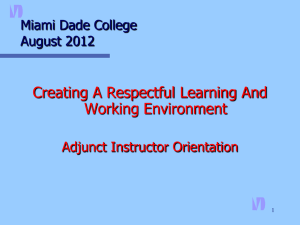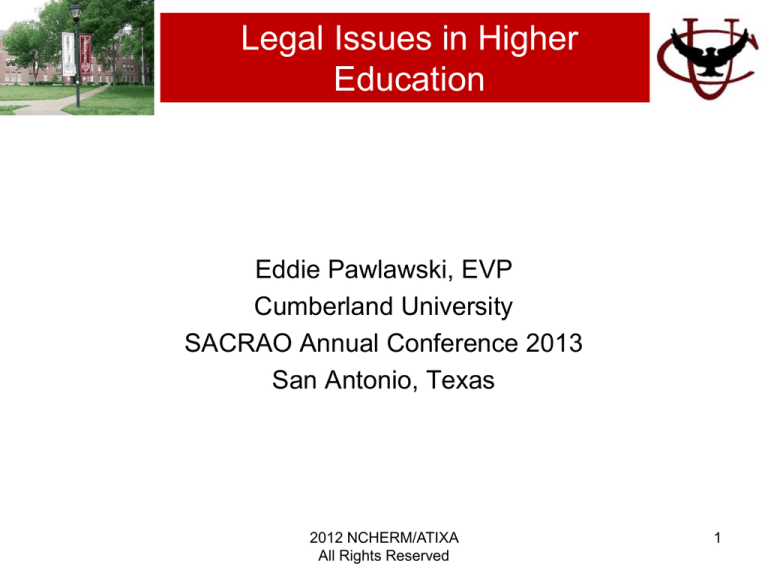
Legal Issues in Higher
Education
Eddie Pawlawski, EVP
Cumberland University
SACRAO Annual Conference 2013
San Antonio, Texas
2012 NCHERM/ATIXA
All Rights Reserved
1
DISCLAIMER
The information shared is not intended to be
legal advice – it portrays a wide range of
recent issues which are important to higher
education professionals – please check with
your campus legal resources.
2012 NCHERM/ATIXA
All Rights Reserved
2
Legal Issues in Higher
Education
•FERPA
•Harassment and federal legislation
•Harm to self
•ADA and Section 504
2012 NCHERM/ATIXA All Rights
Reserved
3
Emergency Exemption
• FERPA
– FERPA’s health or safety emergency
provision permits such disclosures, without
the consent of the parent or eligible student, if
necessary to protect the health or safety of
the student or other individuals. See 34 CFR
§§ 99.31(a)(10) and 99.36.
– “articulable and significant threat.”
– http://www2.ed.gov/policy/gen/guid/fpco/ferpa/index.html
2012 NCHERM/ATIXA
All Rights Reserved
4
Emergency Exemption
“The phrase “articulable and significant threat” means
that if a school official can explain why, based on all the
information then available, the official reasonably
believes, for instance, that a student poses a significant
threat, such as a threat of substantial bodily harm to any
person, including the student, the school official may
disclose personally identifiable information from
education records without consent to any person whose
knowledge of the information will assist in protecting a
person from threat.”
http://www2.ed.gov/policy/gen/guid/fpco/pdf/emergency-guidance.pdf
2012 NCHERM/ATIXA All Rights
Reserved
5
Emergency Exemption
While the Family Educational Rights and Privacy
Act (FERPA) generally requires parents or
eligible students to provide educational agencies
and institutions with written consent before the
school discloses personally identifiable
information from a student’s education records,
FERPA allows schools to make necessary
disclosures without obtaining prior written
consent in order to address emergencies.
http://www2.ed.gov/policy/gen/guid/fpco/pdf/emergency-guidance.pdf
2012 NCHERM/ATIXA All Rights
Reserved
6
Emergency Exemption
FERPA does not prohibit a school official from
disclosing information about a student that is
obtained through the school official’s personal
knowledge or observation and not from the
student’s education records. For example, if a
teacher overhears a student making threatening
remarks to other students, FERPA does not
protect that information from disclosure (under 34
CFR § 99.31).
http://www2.ed.gov/policy/gen/guid/fpco/pdf/emergency-guidance.pdf
2012 NCHERM/ATIXA All Rights
Reserved
7
Discrimination by Type
•
•
•
•
•
•
•
•
•
•
•
Age
Disability
Equal Pay/Compensation
Genetic Information
National Origin
Pregnancy
Race/Color
Religion
Retaliation
Sex
Sexual Harassment
2012 NCHERM/ATIXA
All Rights Reserved
8
Relationship between NonDiscrimination Legislation and
Enrollment Services: A Brand New
Frontier
•Title IX
•Title VII
•Title VI
•Title IV
•Title III
•Section 504
•ADA
2012 NCHERM/ATIXA All Rights
Reserved
9
INTERACTION BETWEEN
STATUTES
Title IX
•Requires investigation, even if victim requests
confidentiality
Clery Act
•Schools can’t require victims to sign confidentiality or nondisclosure agreement in order to access disciplinary
proceeding outcomes in her own case.
FERPA
•Campus security records not protected
2012 NCHERM/ATIXA All Rights
Reserved
10
Clery Act Requirements
•Campus Security Policy
•Daily Crime log
•Annual Security Reporting
•Published Policy Statements
•Published Grievance Policy
•A Designated Individual to Implement Policies
•A Timely Warning System for Reporting
•Clery Act Crimes to the Campus Community
•$27,500 Fines per Violation
2012 NCHERM/ATIXA All Rights
Reserved
11
Jurisdiction
•For Sexual Misconduct/Title IX Cases
•There is an expectation that you have SOME jurisdiction
over off campus incidents
•For all other conduct cases
•Jurisdictional Limitations
•Geographic
•Temporal
•When is a student a “student?”
•Application-Admission-Registration-Attendance-Breaks
2012 NCHERM/ATIXA All Rights
Reserved
12
Policies and Procedures
•Stalking
•Relationship Violence
•Bullying and Cyber-bullying
•Sexual Harassment
•Sexual Misconduct
•Retaliation
•The Appeals Process
2012 NCHERM/ATIXA All Rights
Reserved
13
Title II
• Involuntary medical withdrawals are a tempting
option for colleges and universities in the wake
of recent school shootings and the rise of
suicidal behavior on campus.
• These withdrawals are fraught with legal and
policy difficulties that have the potential to harm
both the student and the university.
• There are key issues related to these
withdrawals and alternative paths to consider.
2012 NCHERM/ATIXA All Rights
Reserved
14
• Following the Title II change in March of 2011, the
Office of Civil Rights (OCR) has narrowed the
language regarding the removal of students from
“threat to self and others” to “threat to others.”
• In effect, it shifts an institution’s ability to remove
students from campus who are suicidal,
psychotic, or experiencing another severe mental
health episode through the involuntary medical
withdrawal policy.
2012 NCHERM/ATIXA All Rights
Reserved
15
What does this mean?
As a result of the change in language in Title II of the
Americans with Disabilities Act (ADA), the revised
regulation now deems it unlawful to take adverse
action (i.e. involuntarily separate, suspend or expel)
towards a student solely on the basis of self-harmful
or suicidal behaviors.
2012 NCHERM/ATIXA All Rights
Reserved
16
Understanding ADA
Accommodations Policy
• Brett A. Sokolow, Esq., Managing Partner,
NCHERM
• “Section 504 gives recourse to students who are
discriminated against on the basis of a
recognized disability. The Americans with
Disabilities Act (ADA) entitles students who are
otherwise qualified to participate in the programs
and activities of college to reasonable
accommodations once they seek qualification
with the campus disability services office...”
2012 NCHERM/ATIXA All Rights
Reserved
17
Understanding ADA
Accommodations Policy
• “Suicide and its attendant psychological distress
is a qualified disability under both ADA and
Section 504. The ADA requires that we provide
reasonable accommodations to an otherwise
qualified suicidal student.”
• “Neither law requires that a suicidal student
march into the disability services office to qualify
as disabled. Once suicidality is clear to college
officials, our obligations under these laws are in
effect.”
2012 NCHERM/ATIXA All Rights
Reserved
18
Section 504
Scope of Covered Programs
All of the college’s operations, programs and activities
subject to Section 504 requirements, including:
Academics
Athletics
Employment
Housing
Events
Web-based educational services
2012 NCHERM/ATIXA All Rights
Reserved
19
Animals, Meal Plans and
Medical Room
Service Animals (narrowing definition 3/15/2011):
•
Service Animals. The rule defines "service animal" as a dog that has
been individually trained to do work or perform tasks for the benefit of
an individual with a disability. The rule states that other animals,
whether wild or domestic, do not qualify as service animals. Dogs that
are not trained to perform tasks that mitigate the effects of a disability,
including dogs that are used purely for emotional support, are not
service animals. The final rule also clarifies that individuals with
mental disabilities who use service animals that are trained to perform
a specific task are protected by the ADA. The rule permits the use of
trained miniature horses as alternatives to dogs, subject to certain
limitations. To allow flexibility in situations where using a horse would
not be appropriate, the final rule does not include miniature horses in
the definition of "service animal."
http://www.ada.gov/regs2010/factsheets/title2_factsheet.html
2012 NCHERM/ATIXA All Rights
Reserved
20
Animals, Meal Plans and
Medical Room
Service Animals (miniature horses):
•
•
“In addition to the provisions about service dogs, the
Department’s revised ADA regulations have a new,
separate provision about miniature horses that have been
individually trained to do work or perform tasks for people
with disabilities. “
(Miniature horses generally range in height from 24 inches
to 34 inches measured to the shoulders and generally
weigh between 70 and 100 pounds.) Entities covered by
the ADA must modify their policies to permit miniature
horses where reasonable.
www.ada.gov/service_animals_2010.htm
2012 NCHERM/ATIXA All Rights
Reserved
21
Animals, Meal Plans and
Medical Room
Therapy Animals:
•
“Most animals, including but not limited to those labeled
Companion Animals, Emotional Support Animals and
Therapy Animals or pets are NOT service animals
according to ADA’s definition, as they have NOT been
individually trained to perform disability mitigating tasks.
Thus their handlers do not legally qualify for public access
rights. Typically these animals also lack the months of
training on obedience and manners needed to behave
properly under challenging conditions in places of public
accommodation.”
http://www.iaadp.org/iaadp-ada-training-requirements.html
2012 NCHERM/ATIXA All Rights
Reserved
22
Animals, Meal Plans and
Medical Room
Meal Plan Exceptions
• Medical or psychological needs or restrictions
• The key question to consider is “Is their a
reasonable accommodation that can be put in
place to help the student meet their request?”
2012 NCHERM/ATIXA All Rights
Reserved
23
Animals, Meal Plans and
Medical Room
Meal Plan Request
•
•
•
•
•
•
Documentation
Diagnosis, last appointment
Activities substantially limited by the condition
Copies of test or laboratory report that support the
diagnosis
Must be recent in order to assess the current and
substantial impact on a major life activity
Should be sufficient to establish a direct link between the
underlying impairment and the request
2012 NCHERM/ATIXA All Rights
Reserved
24
Animals, Meal Plans and
Medical Room
Some reasons a request isn’t granted:
•
•
•
•
•
•
•
•
I don’t finish my meals so it wastes money on the meal
plan
I don’t need as many meals as the school offers
I eat vegan or vegetarian
I’m not around (my schedule) when it is time to eat
Personal convenience
I don’t have enough money to participate
I have a Gluten based disorder
Documentation by a family member
2012 NCHERM/ATIXA All Rights
Reserved
25
Animals, Meal Plans and
Medical Room
Medical Single Room/Off Campus Housing
• Allergies
• Social Phobia
• Insomnia, depression, anxiety
• Orthopedic problems
•
The issue of reasonable accommodation here for the
school becomes a large one---at what point can the
school create a room that can accommodate?
2012 NCHERM/ATIXA All Rights
Reserved
26
Animals, Meal Plans and
Medical Single
Medical Single
•
•
•
•
•
•
Documentation
Diagnosis, last appointment
Activities substantially limited by the condition
Copies of test or laboratory report that support the
diagnosis
Must be recent in order to assess the current and
substantial impact on a major life activity.
Why a medical single or a special housing
accommodation(s) is necessary for the student's physical
or mental health
2012 NCHERM/ATIXA All Rights
Reserved
27
Animals, Meal Plans and
Medical Single
Reasons requests aren’t granted (FAQ)
• I like being alone
• I can’t study around people
• I need at least ten hours of sleep
• Documentation from family member
2012 NCHERM/ATIXA All Rights
Reserved
28
Questions?
Eddie Pawlawski
epawlawski@cumberland.edu
2012 NCHERM/ATIXA All Rights
Reserved
29

